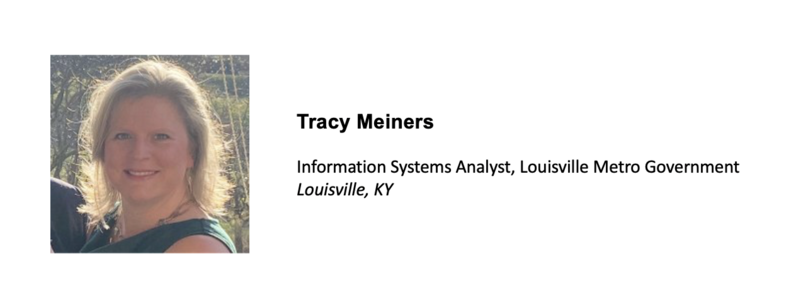Introducing Tracy, Information Systems Analyst at Louisville Metro Government
Home of the world-famous Kentucky Derby—and birthplace of the cheeseburger—Louisville is a vibrant city with a robust economy, a thriving arts scene and an innovative spirit.
A few years ago, Kentucky’s largest city set out to reduce its carbon footprint and create a culture of sustainability through a variety of educational and technology initiatives. That’s when Paper-free by 2023 was born.
For this spotlight, we’re pleased to introduce you to the IT champion who’s leading the charge to dramatically reduce paper usage across city agencies.
Meet Tracy

Tracy has been a part of the Louisville Metro team since 2016 when she came on board to help city employees do their jobs more efficiently—and find innovative solutions to technical challenges.
We talked to Tracy about how making the move to DocuSign eSignature helped the city drastically reduce paper usage while accelerating relief efforts during the COVID-19 crisis.
What’s driving the paper-free by ’23 initiative—and how is DocuSign helping you achieve your goal?
The initial push was driven by the fact that we were printing a lot of paper—which was not only an environmental issue but a cost issue, too. We were spending a lot of money on paper. We started using DocuSign about two years ago—but only internally within our agency. Once the pandemic hit, the deputy director came to me and said, “We need to get this out to every agency that has a use for it—and that’s what I did.”
Where have you seen the biggest impact as a result of the implementation?
One of the unintended consequences of paper-free by ‘23 was this huge increase in productivity. Some of the biggest champions in the beginning were the grant accountants. Before, they were having to mail grant agreements out to get signatures and then have them mailed back. Their average turnaround time was about 10 to 14 days. Now, it’s one or two days.
What adoption strategies were most successful for you?
One way we were able to encourage adoption is finding really good use cases that other agencies could adopt. For us, that was timesheets and employee performance evaluations, which everyone has to do.
We also have a monthly DocuSign users group meeting. We use that as a forum to talk about how people are using DocuSign and hopefully plant some seeds on how other agencies might be able to use it. We also use that time to answer any questions, share tips and tricks and show the environmental impact of e-signatures.
What role did DocuSign play during the pandemic?
We used DocuSign for several COVID relief programs—including utility assistance and eviction prevention—which were funded through the CARES Act, and the One Louisville Fund, which was completely funded by people in and outside of the metro. These forms were pretty robust, and we used a lot of conditional routing. We also used DocuSign to quickly screen and onboard volunteers when LouVax [mass vaccination site] opened up at Broadbent Arena.
What is one of your favorite things about using DocuSign?
It’s satisfying when you're helping your internal people be more efficient and feel like they can do their job in a better way. And it's really great when, as a city, we get to show the people that live within it how efficient their government is. That’s not a term that's used with government very often, and we want to change that. I feel like DocuSign is really helping us with that.
How confident are you that you’ll achieve your goal of going paper-free by 2023?
We’re close to reaching our goal ahead of target!
What are top priorities for Louisville Metro this year—and how might Docusign fit in?
We’re going to continue to go from agency to agency, talk to them about their processes that require data inputs and signatures and see where we can find use cases for DocuSign.
Read more about how Louisville Metro improved internal processes while getting faster relief to citizens during a challenging time.